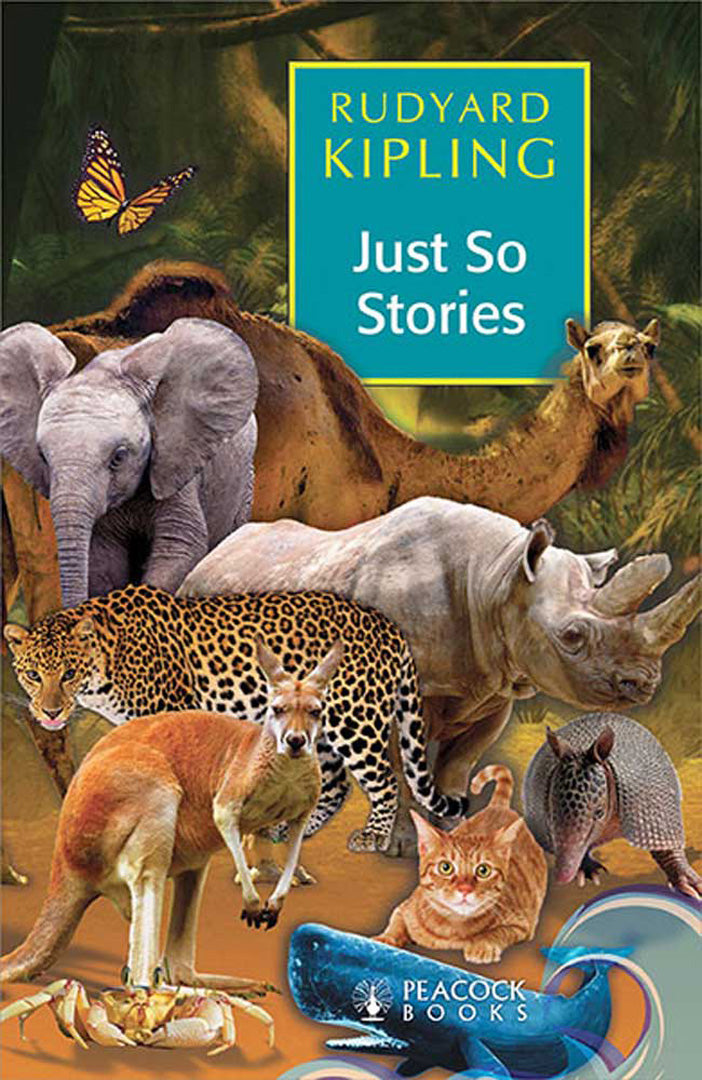Just So Stories
Just So Stories
Rudyard Kipling
Couldn't load pickup availability
Share

More Information
- ISBN13:
- Publisher: Atlantic Publishers and Distributors (P) Ltd
- Publisher Imprint: Peacock Books
- Publication Date:
- Pages: 112
- Binding:
- Item Weight:
- Original Price:
About The Book
Just So Stories is a collection of 12 interesting stories with eccentric myths created by Rudyard Kipling. Most of the stories are fanciful revelations of how certain animals came to possess their distinguishing features. The characters are humorous and archetypal and most of the tales offer some affectionate caution and insight into the consequences of indulging in sinful traits like sloth, greed and envy.
Kipling is accredited with knowing how to weave a spell in children’s stories, and being playful and inventive with language. He takes us on an adventure to the wilds of Africa, sets his tale among a family of all kinds of animals, and creates a world where they all grow up together in harmony, much like a human family.
The stories in the book typically have the theme of a particular animal being modified from an original form to its current form by the acts of man, or some magical being. Kipling addresses the reader as “Best Beloved”, which strengthens the importance of storytelling, creating a bond between the reader and the author. The book is packed with songs, giving it a lyrical attribute.
Written in grand style with long, interesting expressions, these stories are just as delightful for adults as they are for children. The stories immediately became favourite of the English-speaking world, and are still read with great interest. They were adapted as a 1984 musical, called Just So. In 2007, the Farnham Festival commissioned the composer Paul Ayres to write musical settings of some of the songs from Just So Stories. This bears testimony to the continuing popularity of the book.
About The Author
Rudyard Kipling (1865-1937) was born in Bombay. His father John Lockwood was the author of Beast and Man in India. Kipling too later came to be known for his accounts of India under British rule. In 1871 Rudyard and his younger sister were sent to England, and had been there for seven unhappy years under the guardianship of an elderly relative at Southsea. In 1878 he joined the United Services College, and started writing. At the age of seventeen Kipling came to India again, this time to become a journalist. His Indian experience provided Kipling with a rich store of material, including seven volumes of stories, among which The Jungle Books is most well-known. It was while staying in Vermont in the years following his marriage in 1892, that Kipling wrote The Jungle Books, which brought him instant success.
Kipling was a master storyteller, and The Jungle Books (1894) has been one of his most popular collection of stories about the feats and experiences of Mowgli, a human child, who is lost in the jungle and taken up by a black panther. There he is brought up by wolves for ten years; he learns to eat raw meat and pick out thorns from paws. He is taught the law of the jungle by Baghera and Baloo, his panther and bear friends. He also learns other kinds of lessons from the bees, the monkeys and the tiger. He learns the jungle language and ways as good as the other forest creatures. He learns the jungle rule of loyalty. But the tiger Shere Khan hates him and would kill him. Therefore, he decides to go back to live with the humans in the village.
The Jungle Books contains some of the most charming tales which have been adored by children and adults alike. The stories of Mowgli’s growing up read like some fables of Panchatantra where animals talk and behave in perfectly intelligible human terms, yet remain fine animals.
Again, it is one of the great classics of children’s literature which appeals no less to the adults, who can find some underlying meanings as well. For example, set in India, The Jungle Books has sometimes been considered an allegory for British imperialism. It is also a question of identity, — where does Mowgli really belong, among the pack of wolves or the pack of men? These thrilling tales introduce us to a colourful jungle society which includes bears, panthers, cobras, tigers and also monkeys, bees, etc. Here is, indeed, ‘God’s plenty.’ Together they can be read as an animal parable on the various features of human society itself, from violence, treachery, mistrust to love, loyalty, wisdom. It is also the story of a boy’s growing up which underscores the theme of alienation and struggles with life.
It is an instance of Kipling’s wonderful art of story-telling. The stories of Mowgli’s engaging adventures never flag. Somerset Maugham rightly claimed that in The Jungle Books Kipling’s ‘great and varied gifts find their most brilliant expression.’
Among his other major works are Soldiers Three (1890), Wee Willie Winkie (1888), The Second Jungle Book (1895), etc. Kim (1901), also based in India, remains his most famous novel. Some of his most famous poems are “Gunga Din,” “Rikki-Tikki-Tavi,” “The White Man’s Burden,” etc. Kipling believed and proclaimed the theory of the white man’s burden, and the glorification of British imperialism, and consequently critical opinion on the author has remained deeply divided, though Kipling himself earned the glory to be the first ever British writer to win the Nobel Prize in 1907.

